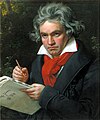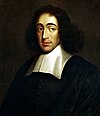Lista panteista





Ovo je djelomičan popis ljudi, svrstanih po godinama rođenja, koji su kategorizirani kao panteisti i imali su značajan utjecaj na panteizam:
- Lao Tzu (604. pr. Kr. – nepoznato), starokineski filozof.[1]
- Heraklit (o. 535. pr. n. e. – o. 475. pr. n. e.), predsokratski grčki filozof, rođen u grčkom gradu Efezu u Joniji, na obalama Male Azije. Imao je istaknuto porijeklo. Malo je poznato o njegovu ranom životu i obrazovanju, no smatrao se samoukim i pionirom mudrosti. Zbog osamljena života kojim je živio, a još više zbog zagonetne prirode svoje filozofije i svoga prezira prema čovječanstvu općenito, bio je nazivan "Mračnim" i "Plačućim Filozofom".[2]
- Eriugena (815. – 877.), irski teolog, neoplatonistički filozof i pjesnik.[3][4]
- Amalrik Benski (umro o. 1204. – 1207.), francuski teolog, otac srednjovjekovnog panteizma, amalrikanci su nazvani prema njemu.
- Giordano Bruno (1548. – 1600.), talijanski dominikanski fratar, filozof, matematičar i astronom.[3]
- Baruch Spinoza (1632. – 1677.), židovsko-nizozemski filozof koji je nazivan "prorokom"[5] i "princem"[6] panteizma.
- Georg Wilhelm Friedrich Hegel (1770. – 1831.), njemački filozof, jedan od tvoraca njemačkog idealizma.[3]
- Friedrich Wilhelm Joseph Schelling (1775. – 1854.), njemački filozof.[3]
- Johann Wolfgang von Goethe (1749. – 1832.), njemački pisac, umjetnik i političar. Njegov korpus djela uključuje epsku i lirsku poeziju napisanu u različitim metrima i stilovima; prozu i stihovane drame; memoare; autobiografiju; književnu i estetičku kritiku; traktate o botanici, anatomiji i boji; te četiri romana. Osim toga napisao je mnogo književnih i znanstvenih fragmenata i preko 10 000 pisama te nacrtao skoro 3 000 crteža.[7]
- Ludwig van Beethoven (1770. – 1827.), njemački kompozitor i pijanist. Ključna figura u prijelazu između era klasicizma i romantizma u zapadnoumjetničkoj muzici, on ostaje jedan od najslavnijih i najutjecajnijih od svih kompozitora. Njegove najpoznatije kompozicije uključuju 9 simfonija, 5 koncerata za klavir, 32 klavirske sonate i 16 gudačkih kvarteta. Također je komponirao ostalu komornu muziku, koralna djela (uključujući slavnu Missu Solemnis) i pjesme. Osim toga bio je također označen kao teist.[8][9][10][11]
- Hans Christian Ørsted (1777. – 1851.), danski fizičar i kemičar koji je otkrio da električne struje stvaraju magnetska polja.[12]
- William Cullen Bryant (1794. – 1878.), američki romantičarski pjesnik, novinar i dugovječni urednik New York Evening Posta.
- Ralph Waldo Emerson (1803. – 1882.), američki esejist, predavač i pjesnik koji je vodio transcendentalistički pokret sredinom 19. stoljeća.[3]
- Henry David Thoreau (1817. – 1862.), američki autor, pjesnik, filozof, slobodni zidar, abolicionist, naturalist, porezni otpornik, razvojni kritičar, geodet, povjesničar i vodeći transcendentalist.[13][14]
- Walt Whitman (1819. – 1892.), američki pjesnik, esejist i novinar.[3]
- Hermann von Helmholtz (1821. – 1894.), njemački liječnik i fizičar koji je uradio značajne doprinose u nekoliko široko različitih područja moderne znanosti.[15]
- Felix Klein (1849. – 1925.), njemački matematičar.[16]
- Albert Einstein (1879. – 1955.), njemački teorijski fizičar, jedan od najplodnijih intelekta u ljudskoj povijesti, identificirao se sa Spinozinim Bogom i imao poglede simpatetične s panteizmom.[17]
- D. H. Lawrence (1885. – 1930.), engleski romanopisac, pjesnik, dramatičar, esejist, književni kritičar i slikar.[3]
- Robinson Jeffers (1887. – 1962.), američki pjesnik, poznat po svojem radu o srednjokalifornijskoj obali.[3]
- Isidor Isaac Rabi (1898. – 1988.), američki fizičar i Nobelov laureat galicijskog roda, poznat po svojem otkriću nuklearne magnetske rezonancije iz 1944. koje se rabi u oslikavanju magnetskom rezonancijom. Također je bio uključen u razvoj magnetrona koji se rabi u mikrovalnom radaru i mikrovalnim pećnicama.[18]
- Ansel Adams (1902. – 1984.), američki fotograf i ekologist.[19]
- Janusz Korczak (1878. – 1942.), poljsko-židovski edukator, pisac za djecu i pedijatar.[20]
- Alan Watts (1915. – 1973.), britanski filozof, pisac i govornik.[21]
- George Sudarshan (1931. – danas), istaknuti indijsko-američki fizičar.[22]
- Alan Vega (1938. – danas), američki vokalist, primarno poznat po svom radu s elektroničkim protopunkerskim duom Suicideom.[23]
- ↑ Levine, Michael P.; 1994; Pantheism: A Non-theistic Concept of Deity; Routledge, 1994; ISBN 0-203-01477-4, ISBN 978-0-203-01477-6
- ↑ Vijay Tankha (2006.). „Heraclitus of Ephesus”. Ancient Greek Philosophy: Thales to Gorgias. Pearson Education India. str. 71. ISBN 9788177589399. »By equating god with nature, Heraclitus could be regarded as a pantheist — everything is god.«
- ↑ 3,0 3,1 3,2 3,3 3,4 3,5 3,6 3,7 Levine, Michael P.; 1994.; Pantheism: A Non-theistic Concept of Deity; Routledge, 1994.; ISBN 0-203-01477-4, ISBN 978-0-203-01477-6
- ↑ Alexander Campbell Fraser "Philosophy of Theism", zbirka lekcija iz 1896. str. 80-82.
- ↑ Picton, J. Allanson, "Pantheism: Its Story and Significance", 1905.
- ↑ Fraser, Alexander Campbell "Philosophy of Theism", William Blackwood and Sons, 1895., str. 163.
- ↑ Robert C. Holub (1986.). Jost Hermand. ur. The Romantic School and Other Essays: Heinrich Heine. Continuum International Publishing Group. str. 223. ISBN 9780826402912. »Goethe was as little a deist as Fichte; for he was a pantheist.«
- ↑ The Gift of Music: Great Composers and Their Influence (3 izd.). Crossway. 1995.. str. 62. ISBN 9780891078692. »Beethoven loved the natural world, but as a pantheist who worships nature rather than the Creator. "Beethoven was not the man to bow to anyone — even God!" said David Ewen.«
- ↑ Ludwig van Beethoven: The Complete Guide. PediaPress. str. 50–52. Pristupljeno 23. listopada 2012.
- ↑ Oscar Thompson (2005.). How to Understand Music. Kessinger Publishing. str. 136. ISBN 9781417992027. »To begin with, Beethoven was strongly individualistic and, in a sense, harshly antisocial. He realized the stature of his own genius. In Nature only did he recognize his equal and for that reason he was a pantheist of the most ardent order.«
- ↑ T. C. W. Blanning (2008.). The Triumph of Music: The Rise of Composers, Musicians and Their Art. Harvard University Press. str. 99. ISBN 9780674031043. Pristupljeno 23. listopada 2012.
- ↑ Joseph McCabe (1945.). A Biographical Dictionary of Ancient, Medieval, and Modern Freethinkers. Haldeman-Julius Publications. Pristupljeno 1. srpnja 2012. »His name is still a classic in the literature of his science and he was in his time a man of high international repute. In regard to religion he was, like Goeth, a Pantheist, as he shows particularly in his Aanden i Naturen (2 vols. 1849).«
- ↑ Howe, Daniel Walker, What Hath God Wrought: The Transformation of America, 1815–1848. ISBN 978-0-19-507894-7, str. 623.
- ↑ Harding and Bode, ur., The Correspondence of Henry David Thoreau, 294. "I was born to be a pantheist."
- ↑ "He never claimed to be an atheist but only a materialist out of respect for the scientific method. For his friend Emil he would have been close to holding pantheistic ideas." Michel Meulders, Helmholtz: From Enlightenment to Neuroscience, stranica 75.
- ↑ Silvan S. Schweber (2000.). „3”. In the Shadow of the Bomb: Bethe, Oppenheimer, and the Moral Responsibility of the Scientist. Princeton University Press. str. 86. ISBN 9780691049892. Pristupljeno 10. srpnja 2012. »There is another thread that tied Felix Klein to Wilhelm von Humboldt: his belief in a preestablished harmony. With Klein and his fellow mathematicians, the Leibnizian preestablished harmony became more specific. It became a preestablished harmony between physics and mathematics and the foundation of their pantheistic faith.«
- ↑ Isaacson, Walter (2008.). Einstein: His Life and Universe. New York: Simon and Schuster, str. 388-389. Izvješteno u New York Timesu od 25. travnja 1929. pod naslovom "Einstein believes in 'Spinoza's God'"
- ↑ John S. Rigden (2000.). Rabi, Scientist and Citizen. Harvard University Press. str. 229. ISBN 9780674004351. »Rabi is deeply religious. Eschewing religious practices, and an anthropomorphic concept of God, Rabi has what Einstein referred to as a "cosmic religious feeling" — a religious sense that transcends dogma and institutions.«
- ↑ "We are now sufficiently advanced to consider resources other than materialistic, but they are tenuous, intangible, and vulnerable to misapplication. They are, in fact, the symbols of spiritual life -- a vast impersonal pantheism -- transcending the confused myths and prescriptions that are presumed to clarify ethical and moral conduct. The clear realities of nature seen with the inner eye of the spirit reveal the ultimate echo of God...." - Adams, Ansel (1950.). My Camera in the National Parks. Boston: Houghton Mifflin. str. 97. Arhivirano iz originala na datum 2012-07-11. Pristupljeno 30. lipnja 2009.
- ↑ Adir Cohen (1994.). The Gate of Light: Janusz Korczak, the Educator and Writer Who Overcame the Holocaust. Fairleigh Dickinson Univ Press. str. 75. ISBN 978-0-8386-3523-0. Pristupljeno 20. travnja 2012. »Korczak's God is a pantheistic one, embracing the entire world.«
- ↑ "As an unabashed pantheist I am naturally a full-blooded transubstantiationist,knowing full well that the ground wheat of bread and crushed grapes of wine are the body and blood of Christ, the Anointed One, or olive-oiled man who is so slippery that he has no hangups." - Watts, Alan (2007.). In My Own Way: An Autobiography. New World Library. str. 72. ISBN 978-1-57731-584-1. Pristupljeno 30. lipnja 2009.
- ↑ George Sudarshan (2003.). Science and the Spiritual Quest: New Essays by Leading Scientists - One quest, One knowledge. Routledge. str. 250. ISBN 9780203398142. »God is not an isolated event, something separate from the universe. God is the universe.«
- ↑ Paul Lester (10. listopada 2008.). „Suicide: How the godfathers of punk kept the faith”. The Jewish Chronicle Online. Arhivirano iz originala na datum 2013-01-17. Pristupljeno 2013-04-28. »Vega is similarly ambivalent. He alludes to the "miraculous" nature of his career with Suicide and fateful meeting with Rev, begging the question - does he believe in a higher power? "I distrust the name ‘God' but, yes, I do believe in a higher power," he says. He adds that he shares the rationalist stance of Spinoza, the 17th-century Jewish philosopher and "pantheist theologian". "God is in all of us," he says, before deciding: "There is an immense power. There has to be."«
- Pantheist Index Arhivirano 2005-12-18 na Wayback Machine-u
- Pantheist Panorama Arhivirano 2015-03-23 na Wayback Machine-u